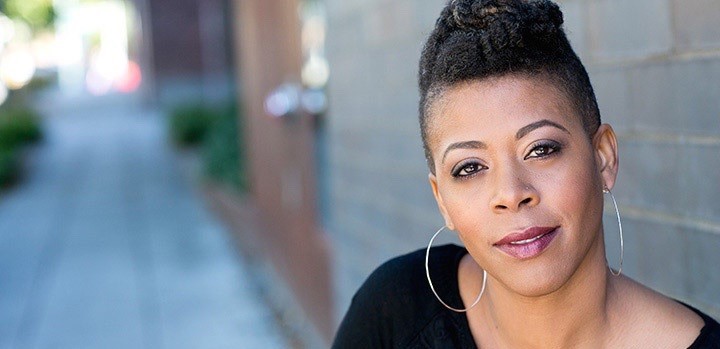2018
Shontina Vernon

Shontina Vernon is a dynamic, multidisciplinary artist whose work is grassroots, visionary, and global in scope. An accomplished filmmaker, theater artist, musician, creative facilitator, and educator, her work champions the necessity of arts and culture to catalyze social change. A believer in the transformative power of art and story, Shontina facilitates workshops using creative writing, theatre, music, and movement to aid marginalized communities in connecting with a sense of voice and agency. She is a 2016-19 Rauschenberg Artist as Activist Fellow, a prestigious two-year grant program funding artistic projects addressing racial justice through the lens of mass incarceration.
From her statement for the grant:
Perhaps it’s the theatre that has given me my collaborative sensibility, or maybe my unconventional, patchwork family, and the ways I struggled very early to make sense of my identity. I’m always looking for how seemingly disconnected parts can work together. And story is often how I make those connections. What is the story of a neighborhood, or an issue, or of an individual, and how does that funnel into the larger story of all of us? Growing up, stories were commonplace in my home of working class, migrant, sharecropping parents. They’ve become fundamental to my creative practice and ultimately to every aspect of my life. I believe their is enormous, transformative power in acknowledging, honoring, and rewriting the stories that become the guiding force beneath all of our interactions. But as James Baldwin said of stories, “You have to be willing to look at them.”
I think, also, the fact that I had this very early experience of being incarcerated as a young person, means that I am aware more than many of the impact of trauma on how we self define, and on our physical and emotional agency. I really am about liberatory spaces where people can be authentic - can tell their honest stories in an effort to heal. This was the impetus for my creating the Visionary Justice StoryLab, and I think is the basis for why we continue to grow and reach groups who are working to reimagine justice.
My work as a multidisciplinary artist, media maker, educator, and business owner means that I move through a lot of spaces, and communities. All of them, in some way, inform each other - whether they know it or not. Sometimes my art and creativity take the form of projects that will unify groups of people who would otherwise never meet. The Common Ground Music Project brought together artists from Seattle and Cuba whose only shared language was art and revolution. At other times, I, myself, am the embodied intersection and I make it a point (as a black/queer/formerly incarcerated/woman) to disrupt spaces that merely exist to prop up systems of structural racism and oppression. Here, I think of panels, and policy rooms. If I didn’t speak, or make work that centers the traditionally marginalized voice, it would be the equivalent to silencing myself. And silence, most especially now, is not an option. Whether it’s plays and songs I’ve written, or labs, community dinners, films, or civic discourse, I am also committed to using my creative lens to connect my community back to itself - to its beauty, to its culture, to its contributions, and yes...to its long forgotten stories.
Visit the artist's website.